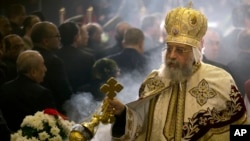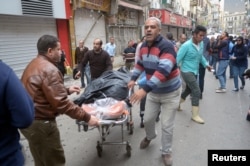The Coptic Christian Pope Tawadros II on Friday canceled most Easter celebrations, limiting them to a simple Mass, following the recent twin attacks on churches by Islamic State militants that killed dozens of Christian worshippers.
During his sermon on Good Friday, Pope Tawadros said, "Easter celebrations shouldn't come at a time of offering condolences to our martyrs.'' He said that the Easter morning reception, in which worshippers exchange greetings, would also be cancelled. In a rare show of discontent and anger, several dioceses and monasteries across the country issued similar statements. After the deadly attacks, Christians blamed the government for failing to protect churches.
During Palm Sunday prayers, suicide bombers targeted two separate churches packed with worshippers in the Mediterranean city of Alexandria and the Nile Delta city of Tanta, killing 45. The Alexandria attack took place as Pope Tawadros was presiding over the service, but managed to escape unharmed.
The Islamic State claimed responsibility and vowed to wage more attacks against Christians, who make up 10 percent of the population.
The attacks prompted the army chief-turned-president Abdel-Fattah el-Sissi to declare a three-month-state of emergency. He also ordered deployment of the armed forces to help police secure vital installations including churches.
The past days witnessed a sharp increase in security measures across the country, with checkpoints set up along the roads that lead to the main churches in Cairo and its adjoining governorate of Giza.
Egypt's Copts, the Middle East's largest Christian community, have repeatedly complained of suffering discrimination, as well as outright attacks, at hands of the country's majority Muslim population.
Over the past decades, they have been the immediate targets of Islamic extremists as Egypt's Orthodox Coptic Christians strongly supported longtime autocratic President Hosni Mubarak before his ouster in 2011. They rallied behind el-Sissi in 2013 as he ousted his Islamist predecessor Mohammed Morsi, who hails from the Muslim Brotherhood group. Attacks on Christian homes, businesses and churches subsequently surged, especially in the country's south.
As the community still reels from the shocking bombings, disgruntled Muslims have attacked Christians' houses and set three on fire in a southern village named Kom al-Lufi, a flashpoint of sectarian tension. The recurrent attacks came after Christians held prayers inside a house, stirring suspicions among the village's Muslims that Christians were planning to turn the house into a church, a common trigger of sectarian violence.
Security forces were deployed on Friday to the village to protect the Christians who were reportedly locked inside their homes for fear of attacks by Muslims.


